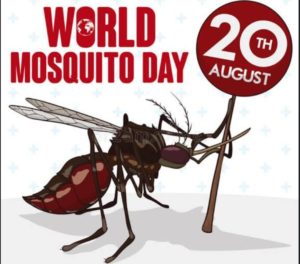Bite Back is an initiative aimed at commemorating World Mosquito Day, which falls on August 20th. This day marks the discovery of the link between mosquitoes and malaria by Sir Ronald Ross in 1897. Bite Back focuses on raising awareness about mosquito-borne diseases and advocating for effective prevention measures. It encourages communities, organizations, and individuals to take actions that contribute to mosquito control and disease prevention, ultimately aiming to reduce the global burden of mosquito-borne illnesses.
Table of Contents

History Of World Mosquito Day
World Mosquito Day is observed on August 20th each year to raise awareness about the dangers mosquitoes pose and the need for continued efforts to combat mosquito-borne diseases. The observance commemorates the discovery made by Sir Ronald Ross, a British doctor, who on August 20, 1897, identified that female Anopheles mosquitoes transmit malaria parasites to humans.
Ross’s groundbreaking discovery marked a significant step forward in understanding the transmission of malaria, a deadly disease that affects millions of people worldwide. His work paved the way for further research into mosquito-borne illnesses and strategies for controlling their spread.
World Mosquito Day is also an opportunity to highlight ongoing efforts to prevent and control mosquito-borne diseases like malaria, dengue fever, Zika virus, and more. Various organizations and health agencies use this day to promote awareness campaigns, educational programs, and initiatives aimed at mosquito control and disease prevention.
In summary, World Mosquito Day commemorates Sir Ronald Ross’s discovery of the link between mosquitoes and malaria transmission in 1897, serving as a reminder of the ongoing global efforts to combat mosquito-borne diseases.
Why To Celebrate World Mosquito Day
World Mosquito Day is celebrated on August 20th every year to commemorate the discovery of the link between mosquitoes and the transmission of malaria by Sir Ronald Ross in 1897. This day serves as an opportunity to raise awareness about the importance of mosquito-borne diseases, their impact on public health, and the ongoing efforts to control and prevent them. It also highlights the need for continued research and innovation to combat these diseases and protect vulnerable populations around the world.
How To Celebrate World Mosquito Day?
World Mosquito Day, observed on August 20th, commemorates the discovery of the link between mosquitoes and malaria by Sir Ronald Ross in 1897. To celebrate this day, you could:
1. Raise Awareness: Spread information about the dangers of mosquito-borne diseases and ways to prevent them.
2. Educational Events: Organize workshops, seminars, or talks about mosquito-borne diseases and their prevention.
3. Community Cleanup: Participate in or organize local clean-up activities to eliminate breeding grounds for mosquitoes.
4. Donations: Support organizations working on mosquito control, disease prevention, and research.
5. Social Media: Share informative posts and infographics to educate others about the importance of mosquito control.
6. Personal Protection: Emphasize the use of mosquito nets, repellents, and appropriate clothing when venturing outdoors.
7. Plant Mosquito-Repelling Plants: Encourage planting mosquito-repelling plants like citronella, lavender, and mint in your garden.
8. Fundraising: Organize fundraising events to support research and initiatives related to mosquito-borne diseases.
Remember, the main aim is to raise awareness about the impact of mosquitoes and how to protect against them.
Significance
World Mosquito Day, observed on August 20th, commemorates the discovery made by Sir Ronald Ross in 1897 that female mosquitoes transmit malaria. This discovery played a crucial role in advancing our understanding of mosquito-borne diseases and paved the way for better prevention and control strategies. The day is a reminder of the ongoing efforts to combat diseases like malaria, dengue, Zika, and more, which are transmitted by mosquitoes, and to raise awareness about the importance of mosquito control, research, and public health measures.
Conclusion
In conclusion, World Mosquito Day serves as a crucial reminder of the ongoing global efforts to combat mosquito-borne diseases and their impact on human health. From its historical significance to modern-day advancements in mosquito control, this observance underscores the need for continued research, public awareness, and collaboration among nations. As we commemorate this day each year, let us remain committed to finding innovative solutions that not only reduce mosquito populations but also protect vulnerable communities from the diseases they transmit. By working together, we can create a world where the threat of mosquito-borne illnesses is minimized, improving the well-being of people around the globe.
Click on the following link
